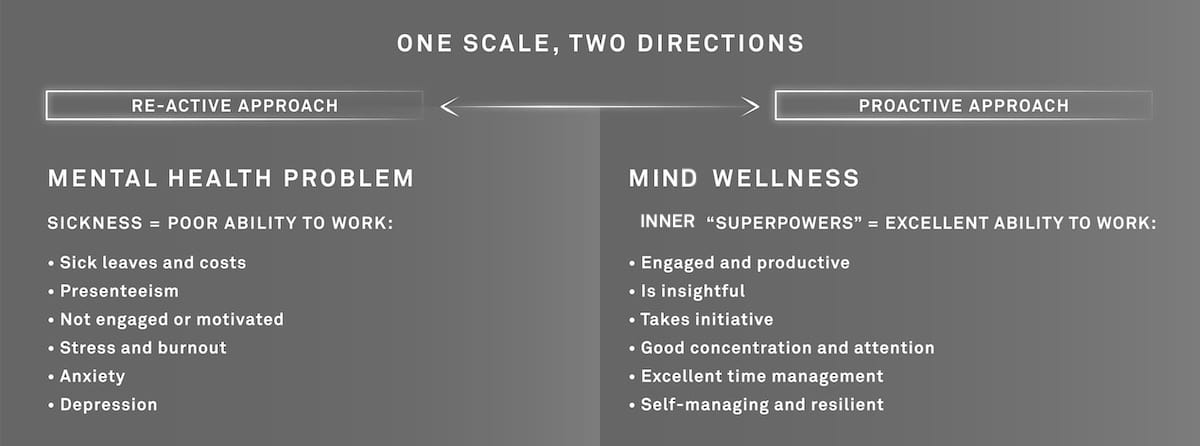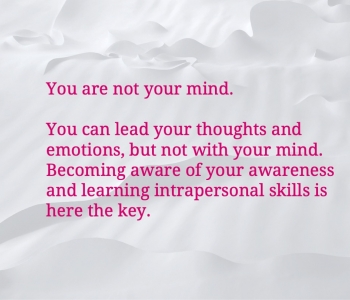Mental wellness strengthens personal initiative
As leaders, we have all seen how people in our teams are often unable to stay focused and fully concentrated. We also see a lack of initiative and that when things pile up people become susceptible to stress, burnout, and more serious mental health issues like depression and anxiety.
- What can be done to prevent mental health problems?
- How can we have a more proactive approach to our business in order to get the best out of our people?
You have probably noticed that initiative and responsibility are always personal. How good a person is at these always depends on their ability to use their awareness and intrapersonal skills.
Awareness as the key to mental wellness
Awareness is something that every one of us uses to some extent in our daily lives.
How much awareness we use depends on our own ability to notice where our awareness is. When awareness isn't controlled by our own will, it functions on the ‘autopilot’ mode falling on the strongest and newest stimuli around us.
To find a solution it is a good idea to observe to what extent people in your team are able to notice their own behavior. Do they really understand why they behave in certain ways?
When you ask why they do something in a certain way, they perhaps don’t actually know or aren’t sure how to answer, as their action is automatic.
If you want your team members to stay at the very peak of their performance, it is necessary to dispel some myths.
Multitasking is an illusion reducing productivity
We have all heard multiple cases in favor of the ability to multitask, but scientific evidence has now revealed that constant multitasking is in actual fact severely counterproductive.
Multitasking has been found to increase the number of mistakes by half. It leads to a decrease in the quality of work and increases subjective stress and energy loss. For example, Dr. Gloria Mark (University of California, 2014) demonstrated that when interrupted, on average it takes 23 minutes for us to refocus and 45% of the time distractions occur by self-interruption via internal factors.

A Harvard study from 2012 showed a short two-minute clip to a group of willing participants. The results found that even with the utmost willpower applied, only 46.9% of test subjects managed to maintain their focus throughout the two-minute clip.
This is evidence that our awareness isn't stable and most are unable to manage it effectively and with purpose.
Such research makes a compelling case for the need to increase employee efficiency by introducing awareness-based training programs that help employees focus on the task at hand.
Once people notice where their awareness is, they find it easier to distinguish the important tasks from unimportant ones and instead of superficial multitasking, they can solve one problem at a time more efficiently. This significantly improves productivity.
Being aware of what you do also enables you to set priorities and find reliable and realistic solutions that we have to make in work situations where we are often overloaded with a continuous flow of information.
Provided that you as the leader enable your staff to see the bigger picture behind their individual tasks will also improve their engagement as your team members notice how their work influences others and the whole company.
The importance of awareness (of our awareness) is overlooked in today’s business environment.
Training awareness-based intrapersonal skills will also allow better endurance in all kinds of stressful situations.
People with excellent intrapersonal skills aren't so prone to burnout and are less susceptible to common illnesses, resulting in fewer sick-related absences from work, benefitting leaders and their employees. Providing practical intrapersonal education for your team is a sure win-win situation.
Look at change as your opportunity
Awareness is the polar opposite of routine and automatism. Becoming aware of your awareness is a conscious choice to stop living a memory-based view of life.
You are neither longer acting out of convenience nor copying of that what others have done. Instead, you create a live map of everything taking place in real time.
Being present is seeing things the way things really are.
Change is a constant and using awareness will enable you to be ready to keep up with the pace of reality, without lingering on all that has happened or that may yet happen.
Decisions in your company are always made in the present time, taking account of the present situation and available recourses.
We haven't been trained to use our awareness, but rather the memory-based mental apparatus. Memory stores reflections of our past experiences – all it stores is long gone or combinations of the old.
Thinking is actually just rearranging the data within our memory. There is nothing new that can be gained from there.
When memory is old data then using your awareness enables you to see what is new and unique in the present moment. It enables you to experiment and explore.
Let us give a simple example: tasting an orange is a completely different experience from explaining the taste of an orange to someone. An aware eating experience reveals so much more information – the texture of the orange, taste sensations, how it feels in your mouth, etc. Merely reading or hearing and then thinking about someone else’s previous experience can never do that.
Awareness lets you observe and incorporate new information into your solutions. In this sense, applied awareness is beneficial for the evolvement of greater creativity, psychological flexibility and equally important in retrieving information from memory.
When we live a memory-based version of life, we are afraid of innovation. We are unwilling to enter situations that we have no solution for in our memory.
The freshest information is always right in front of us and fearfully clinging to memory-based experiences only ignites our unrealistic fears of change.
Awareness is the key to opening up creativity
There is no such thing as creative thinking. Thinking and creativity represent polar opposites.
Creativity is an awareness-based intrapersonal skill that is impossible to access through thinking. Thinking, on the other hand, is a mentality-based intrapersonal skill. Thinking and creativity are fundamentally different.
Try thinking of something that you don't know. Can you?
Why do you fail?
Thinking is based on what we have heard, seen, and know. Creativity appears when we look for something new, something we don't know; thus can access it only through awareness and inner silence.
By using our awareness to notice changes, people can keep pace with the actual reality and become more innovative.
People who are aware perceive change as an opportunity and ally.
On the other hand, being constantly in autopilot mode sees us not coming into any real contact with anything; everything becomes an automatic preconception-based experience built on a past memory.
Awareness as an alternative to our mental apparatus
When trying to focus or listen to someone, you may have noticed that at times you have started to think about completely non-connected issues.
Actually, the very instant you notice your mind has wandered somewhere else; you get a glimpse of your awareness. It is your awareness that enabled you to notice your mind wandering. To observe this, you have stepped behind your thoughts.
According to the master teacher of awareness and author – Ingvar Villido, your awareness is the link between you – the one who notices, and the object of your observation. What blocks awareness is our constant emotional reactivity, but you can remove this with Practical Consciousness practices.
People face internal obstacles more often than external ones. Constant mental monologue or thinking is a constant is an inner noise and it is one of the main reasons why we lose track of work-related tasks.
We should use our mental apparatus the same way we use our computers, smartly and purposely. Our normal inner state is a state of silence, not of constant thinking.
When we use our mental apparatus for its intended purpose, we can acquire more insights and ‘eureka!’ moments.
The less burdened our mental apparatus is, the more active our awareness can become.
It’s important to note that the information is acquired via becoming aware (noticing) first and then the accompanying mental description that follows. The description is always secondary. However, this secondary commenting is often the only thing we notice.
For example, tasting an orange is the primary event and only after you have tasted it you can use your mental apparatus to describe the experience. However, the description you come up with isn't the eating experience itself.
By using your awareness you will learn to appreciate real actual experiences and pay less attention to descriptive thoughts. After such a breakthrough we feel much more alive and notice how much depends solely on us.
It enables us to notice that we are responsible for how we make ourselves feel and how we act. It also demonstrates the importance of personal initiative and engagement with tasks.
Only you can change you
Every change begins internally. Only you can change your own attitude, no one else can do it for you.
It might seem that we know everything and have the answers to every question, that everything is already discovered and fully explored, but it is only so until we start using our awareness.
When we use our awareness we see all situations as new and challenging. That challenge of solving situations and finding solutions can become our internal motivation. A motivation that is non-emotional and based on achieving new and unique results.
Conclusion
By using awareness to concentrate we are in direct contact with the task at hand. We notice that we don't really multitask, but switch tasks.
Awareness enables faster focusing and a better understanding of the content of tasks we are involved with.
Being aware of where your attention is will allow you to make purposeful decisions under all circumstances. When all people in your team possess such ability work becomes easier.
Awareness is here the key that secures opening up mental wellness and strengthens personal initiative. A more awareness focused lifestyle allows you and others around you to take control over your work and life and enables us all to achieve excellent mind health.
Before moving on, discover what benefits this web page offers in training your mental wellness by observing the graph below and looking up our fairly prised mind health online trainings.

|
This blog post is written by Kaur Lass and edited by Chad Palmer






